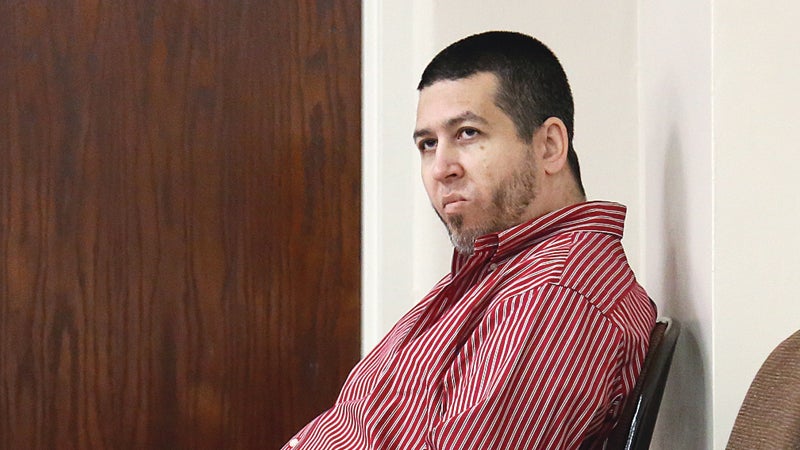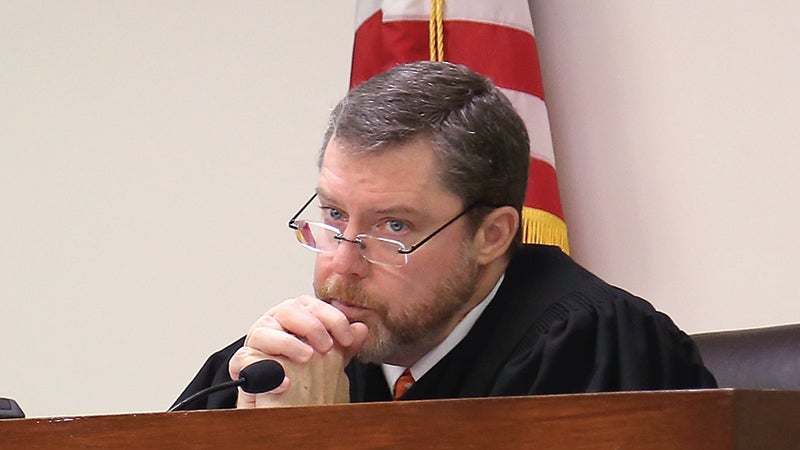Judge denies motion to dismiss double murder case; Street deems officer’s failure to preserve evidence ‘gross negligence’
A Carter County judge ruled on Friday that while the Carter County Sheriff’s Office’s failure to preserve evidence in a murder investigation constituted “gross negligence,” the evidence in question was not substantial enough to warrant dismissal of the indictment against a double-homicide suspect.
On Monday, attorneys for Eric James Azotea filed a pair of motions in Carter County Criminal Court seeking the dismissal of the indictment against their client. Azotea, 46, of the Pinecrest community, stands charged with two counts of first-degree murder, two counts of abuse of a corpse, and one count of tampering with or fabricating evidence. The charges stem from an investigation by the Carter County Sheriff’s Office into the disappearance and murder of Art Gibson and Amber Terrell in 2015. District Attorney General Tony Clark is seeking the death penalty in the case.
In the first motion for dismissal filed by Azotea’s attorneys, the defense asks the court to dismiss the indictment against Azotea on the grounds that the state failed to preserve evidence in the case.
The evidence in question is a security video from the Elizabethton Walmart which shows Azotea’s live-in girlfriend Kristen Jones shopping in the store around the time the murders were allegedly committed.
According to the defense motion, a Tennessee Bureau of Investigation report lists that CCSO Deputy Chief Investigator Mike Little requested the surveillance footage and the report said Little will maintain the video in evidence at the Sheriff’s Office. However, according to the motion, when defense attorneys requested a copy of the video they were told the video could not be found.
In the State’s response to the motion, prosecutors said in preparation for Azotea’s trial they inquired about the existence of any recovered video footage for the Walmart visit, but investigators could not locate any such recording.
During Friday’s hearing, Little took the stand to testify about the surveillance video and its unavailability as evidence.
According to Little, CCSO investigators used technology to track Jones’ cellphone, which showed that she was in the area of the Walmart and Lowes stores around the time indicated by Azotea. Little said he went to Walmart and TBI Special Agent Brian Fraley went to Lowes to attempt to locate Jones on security footage.
Little said he spoke with a Walmart employee who located Jones on store security cameras. Little testified that while he did watch a portion of the video, he did not watch all of it. Little said he asked the employee to make a copy of the video, but he never went back to collect it. Jones was purchasing common household items during the shopping trip and not anything that would send up any red flags, so Little said he didn’t feel the video was important to the case in light of other evidence and Azotea’s confession.
Fraley also took the stand and testified that when Little told him about the security footage it was his understanding Little would collect and preserve the video and that’s why he listed it on his investigative report.
Attorney Gene Scott, one of the attorneys representing Azotea, argued to the court that the State had a duty to collect and preserve that evidence due to the severity of the charges against Azotea and also because the video involved Jones.
“At best in this case, Ms. Jones is an unindicted co-conspirator,” Scott said, adding Jones participated in disposing of Gibson and Terrell’s vehicle after their deaths. “This is a capital murder case. They should have preserved the evidence, there is no question about that.”
“It calls into question the reliability of the trial Mr. Azotea will receive,” Scott added, calling the actions of the investigators examples of “gross negligence” in failing to preserve the evidence.
The District Attorney’s Office argued that while the officers may have had a duty to preserve the video as evidence, the value of that evidence would have been minimal at best.
Assistant District Attorney Dennis Brooks stated that Azotea admitted he sent Jones to the store for the purpose of getting her out of the house in order to hide the bodies of Gibson and Terrell. He pointed out that Jones also told investigators she went to Walmart at Azotea’s direction. The video would have merely corroborated their statements, according to Brooks.
“We don’t see any conceivable scenario where that tape would have somehow helped this defendant in his trial for two homicides,” Brooks said.
After hearing the arguments from the attorneys, Criminal Court Judge Stacy Street issued his ruling finding the state had a duty to preserve the video in the case once they discovered its existence.
“The court finds that there is no doubt that there was negligence in this case,” Street said. “That video should have been obtained, and a copy should have been preserved at the Sheriff’s Department.”
“The court finds this borders on being gross negligence, failing to preserve that important piece of evidence in a capital case,” Street continued. “It is gross negligence on the lower end of the scale.”
While Street said he felt the investigators were negligent in not preserving the video, he added in the court’s opinion that negligence did not rise to a sufficient level to warrant the dismissal of the case against Azotea.
“This trial can proceed without that video,” Street said. “The other evidence is reliable, and the other evidence is available.”
During his ruling, Street noted that other evidence in the case includes a confession by Azotea that he did kill Gibson and Terrell. Street previously ruled that confession is admissible as evidence at the trial.
Street denied the request to dismiss the case due to the State’s failure to preserve the evidence.
In the second motion seeking dismissal of the case, the defense team argued that the District Attorney’s Office had failed to respond in writing, as directed by the court, as to any immunity agreements or other special treatment or leniency granted to of any of the state’s witnesses in the case. The motion specifically inquires about the immunity agreement granted to Jones in exchange for Azotea’s confession and any leniency or special favors Jones received as a result of her arrest in October 2017 on a charge of possession of methamphetamine.
In response, District Attorney General Tony Clark argued before the court that he had previously spoken on the record in the case in front of the defense team regarding Jones’ immunity agreement and there were no other agreements which his office entered into with witnesses. He said he felt the discussion in open court relieved him of the need to submit his answer to the defense’s request in writing.
Street ultimately denied that motion for a new trial based on the State’s failure to provide a written response to the inquiry by the defense. However, the judge also directed Clark that his office is to file all responses in writing, even when dealing with matters which had been addressed in open court.
Azotea is scheduled for trial in the case February 5 through February 17. Jury selection will begin on January 29 with individual juror questioning. Once the trial begins, the jurors selected to serve on the panel for the trial will be sequestered throughout the duration.







